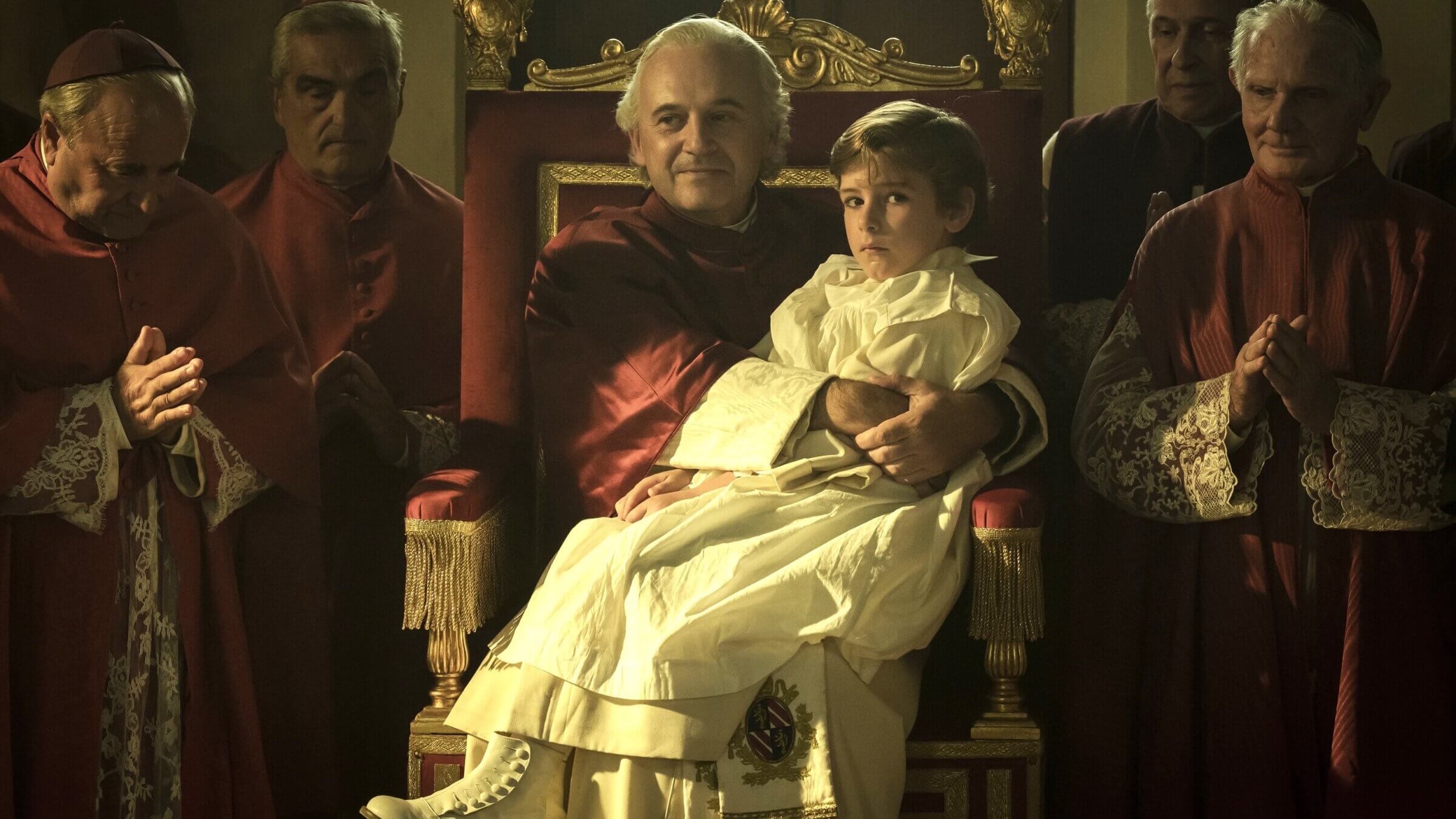This movie tells the true story of a 6-year-old Jewish boy — baptized, kidnapped and raised by the Pope
Marco Bellocchio’s ‘Kidnapped’ is a sumptuous, scary retelling of the Mortara Affair

Paolo Pierobon as Pope Pius IX and Enea Sala as Edgardo Mortara in Kidnapped. Courtesy of Cohen Media Group
Enough time has passed, the Vatican decided in 2019, to examine the record of Pope Pius.
The church unsealed papal archives long sought after by historians, and researchers have begun to paint a damning portrait. Pius XII, the head of the church through World War II, was not the quiet hero of Jews that many defenders long claimed. In September, unearthed letters suggested that Pius knew the genocidal worst about the death camps and said nothing and, last year, historian David Kertzer’s book The Pope at War revealed that Pius only interceded on behalf of a very specific victim: ethnic Jews who were baptized.
Into this context arrives another reappraisal, of another Pope Pius, on a similar theme. The film Kidnapped explores the case of Edgardo Mortara, a 6-year-old Jew from Bologna who was secretly baptized, taken from his family and made a kind of ward to Pope Pius IX. The story, which Kertzer chronicled in a 1997 book, and was for a time in development with Steven Spielberg and Tony Kushner, is realized with period aplomb by director Marco Bellocchio. It is a righteously angry work, limned with disturbing beauty. The film is at its most unsettling, and damning, when the violence of Edgardo’s abduction gives way to the quieter trauma to his soul in the pristine halls of papal Rome.
Bellocchio, a Marxist and atheist raised in the church, was drawn to the story of Mortara — whose 1858 kidnapping prompted outrage throughout Europe and the United States — as a “crime committed in the name of an absolute principle.” And so we see the certainty of Pius’ functionaries, who ferry Edgardo away from his home and deposit him in the House of the Catachumens, an institution for the conversion of Roman Jewry. Edgardo meets the Pope and, with other Jewish children, eats sweets at his table on the Feast of the Immaculate Conception and even takes a seat upon his lap.
Throughout the film, the pageantry of the church is juxtaposed with the domestic faith of the Mortaras. A detailed crucifix at an altar and a Latin catechism are spliced with the Mortaras’ grief as they prepare for Shabbat or, with their other young children, recite the shema before bed. In Bellocchio’s accounting, Jewishness lives at home, with Edgardo’s true family, and it is lovingly rendered. Scenes in the House of Catechumens are caustic in their sterility, but terrifying for how pleasant, and even gorgeous, they often appear.
When Edgardo (played as a child by Enea Sala) reunites with his parents, wonderfully portrayed by Barbara Ronchi and Fausto Russo Alesi, their worst fears are realized. Their child is eating well and feeding off the indoctrination of the priests. Edgardo’s terror, and his desire to return home, are bound up in a harder-to-shake belief that his baptism was in fact an act of grace. The message comes through when young Edgardo is asked to define “dogma,” and describes it as a matter set down and not open for debate, a deeply un-Jewish concept echoed in Pius IX’s non possumus, in which he refused to return the child to his parents.
While presenting the Pope (Paolo Pierobon) as a paranoid tyrant whose influence is in decline, Bellocchio is eager to grapple with the ambiguities of the true story.
The truth, complicated by the conflicting reports of the time, which either claim Edgardo as a fervid believer and evangelical prodigy or a terrified child whose mother was driven to madness, is that Mortara entered the priesthood when he came of age and resisted returning to his family when the Kingdom of Italy snatched Rome away from the Papal States. Indeed, Edgardo left newly unified Italy rather than make a homecoming, settling in France and eventually dying in Belgium in 1940.
Kidnapped, which sprinkles its stately presentation with bombastic underscoring and moments of magical realism, is certainly an indictment of the church’s excesses, highlighting its cruelty to Jews and its stunning capacity for evading accountability, which has a modern corollary in its sex abuse scandal. More than that, the drama challenges the dogma of Christian viewers who may believe the unbaptized are doomed to hell. The film can’t, however, fully rebuke the church’s power of persuasion, or even the Catholics who still defend the kidnapping.
Belief, it argues, is a more mysterious force than the mortal zealots who serve as its agents. It is tempting, and not unfounded, to regard Mortara’s long tenure in the church as a lifetime case of Stockholm Syndrome begun at a tender age, but that conclusion is the easiest and least interesting.
Toward the end of the film, the adult Edgardo (Leonardo Maltese), whose journey began when a household maid, believing him to be near death, anointed him, hopes to save his mother’s soul in the same way. She refuses baptism.
“I was born a Jew and I will die a Jew,” she tells him. It’s a conviction we must admire, but Edgardo’s position, that Christ alone can save and conversion is an ultimate mercy, can’t be so readily dismissed. Much of the world — and even today’s liberal pope — believe it. Bellocchio’s film is not out to destroy this fundamental article of faith, only the dangerous certitude that enabled the unforgivable.
The film Kidnapped is playing as part of the New York Film Festival Oct. 3 and Oct. 8.























